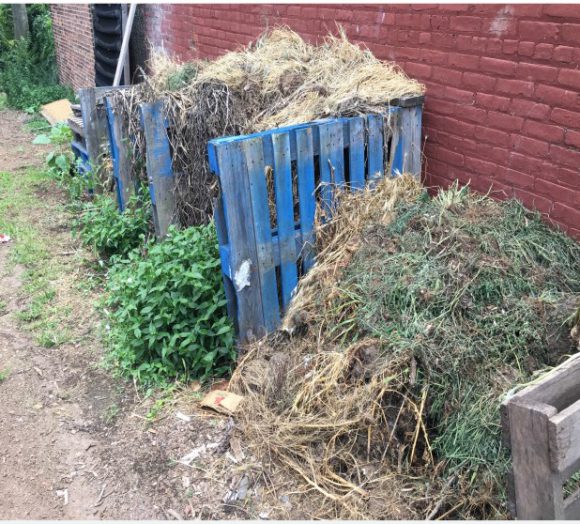
An example of composting that is not properly managed.
By Michele Bakacs, Environmental and Natural Resources agent, Rutgers Cooperative Extension
Reprinted from Green Knight newsletter, August 2017 Note: This article is based on a poster presentation given at the 2017 National Association of County Agricultural Agents conference in Salt Lake City, Utah, which was the first place winner in the poster competition.
Community and school gardens often have composting systems to process food scraps and garden waste. Although gardeners understand the benefits of compost, managing the compost pile is often an afterthought and therefore, often face challenges when trying to conduct group composting in their gardens. These challenges include:
- Too much nitrogen-rich material from lunch scraps and end of season garden plants pulled from their beds. Not enough carbon-rich material such as leaves.
- Planning ahead and storing carbon -rich material for later mixing is not normally done.
- The pile is not turned nor is adequate moisture provided to process the material.
- In school gardens, the compost pile is often neglected in the summer when no one is around to manage it.
In addition, the compost bin is often mistaken for a garbage can. Gardeners are not taught to cut up large material slowing down the composting process. No signage or instruction is provided on how to properly compost. Compost structures are built too large so turning the pile becomes difficult.
Most of these issues stem from a lack of understanding of basic composting techniques as well as no one taking ownership of the compost pile. Rutgers Cooperative Extension has developed a short training to help address these challenges. This effort is part of a state-wide curriculum for Rutgers Master Gardeners which also includes food safety, pest management, and getting gardens started.
Six Master Gardener train-the-trainer programs, and community/ school garden workshops were held between January and October of 2016 with 184 school/ community gardeners, and Rutgers Master Gardeners in attendance. The focus was on how to successfully compost with large groups. An hour composting presentation was delivered covering the following curriculum topics:
What is composting?
- The Soil Food Web
- Composting benefits
- Compost ingredients
- Understanding the carbon to nitrogen ratio
- Examples of compost piles and bins
- Compost management in a school/community garden
Surveys were given before and after the training to determine change in knowledge for the topic areas. Results showed many gardeners were already knowledgeable about appropriate ingredients for a compost pile, although many did not realize how much more carbon-rich material is needed than nitrogen. This is a typical mistake in backyard and community/school gardens, and when combined with lack of aeration and moisture can slow down the composting process and lead to odor problems.
In addition, 56% of gardeners falsely believed the pile should be turned once a month during the growing season and 16% were not sure. A pile should be turned at least once a week.
Often schools are looking for quick results, especially when composting is being used as a teaching tool. Better management of the pile with moisture and turning, and paying attention to the carbon/nitrogen ratio can help speed up the process. One-year follow-up surveys will be sent to participants to determine if this educational session helped them improve their garden’s compost production.
A website is under development with training materials for schools and community gardeners including fact sheets, and scripted and online audio presentations. To find out more about proper composting contact Michele Bakacs at bakacs@njaes.rutgers.edu or 732-398-5274.

